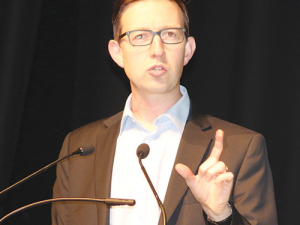That was the message from Miles Beale, CEO of the UK Wine and Spirit Trade Association (WSTA). Speaking at the Bragato Conference Beale was quick to point out that Brexit will change the face of trade for the UK, with more unknowns, than knowns impacting. Given government departments were ill prepared for the result, there is going to be years of leveraging required before the dust settles. Beale said that is due to the lack of trade negotiation knowledge available within UK government departments.
“They have fewer civil servants to do a lot more work, including work that as a government we haven’t done for 40 years,” he explained. “We have no trade experts, so I expect we will be coming to New Zealand to ask for some help, pointers and tips.”
Beale is a big fan of the New Zealand wine industry. He lived here for a number of years as a student teacher, he has a sister-in-law who lives in Queenstown and he has developed close ties with NZW through ongoing meetings with CEO Philip Gregan. That relationship means he is more than prepared to do whatever it takes to ensure access for our wines into the UK are not impaired. This is where the opportunity lies he believes.
“I think there are great opportunities for New Zealand. It is impossible for me to conceive any agreement exclusive on wine where we won’t want a better deal for you guys, than we are already able to offer as part of the EU. The challenge though, will be making sure that anything that comes into the UK can still go to the rest of Europe with no additional tariffs or charges. The twin aim is maintaining the UK as the jumping off point.”
Currently 76 percent of all our wine destined for the EU market, goes first to the UK. Under current rules, that wine does not incur extra tariffs or charges when it travels acoss the Channel. The big question though is, will that remain the same once Brexit is complete?
“The big challenge quite frankly is logistics. What you don’t want is to enter a port in the UK and then have to start a whole new logistics process and paperwork to go on into Europe. We want to be able to preserve the status quo and that is what we are looking at.”
While wineries could bypass the UK altogether, Beale didn’t believe that was likely to be the best bet.
“I would suggest that historical links, language and culture means that the most obvious jumping off point is the UK and I think there would have to be problems because of Brexit to change that model. I wouldn’t like to see that happen. What I would hope is we could maintain the sort of relationship with the EU based on trade, that means it is as easy as it is now.”
From his position as CEO of WSTA Beale believes that working alongside NZW, the two organisations are in a good place to do everything that is needed for the wine industry, on behalf of both sets of government.
“I like to think of it as a joint venture between UK importers and the New Zealand wine industry. We need to come up with this proposal for what a wine trade agreement between our two nations would look like. I think that will be based on a template which we could actually replicate for other nations we trade with. I want to see us get ahead of that curve.”
Until the UK is formally no longer part of the EU, their government cannot undertake any new trade negotiations. Given that may take a good few years to finally achieve, Beale said WSTA and NZW need to be preparing trade agreements in preparation for that time.
“We can do all the preparation so that we are ready the day after we have left the EU and that is what I would like to see the UK and New Zealand cooperate on. We are in a really good place to do everything that is needed for the wine industry on behalf of both our governments. They don’t need to be involved, other than to sign the piece of paper – if we get it right now.”
As for the impact Brexit has had on markets and the potential of consumers to buy luxury goods, Beale is again not too worried. While as a country they are drinking one fifth less alcohol than they were 10 years ago, Beale says premiumisation should help New Zealand wine sales.
“We have seen premiumisation in the UK market for quite a long time now. Sales have dropped but value has absolutely held up. And for well known brands and higher quality premium products, which is where New Zealand wine is incredibly well placed, that pemiumisation can only help. I think New Zealand wine is well placed to weather the issues that might be a problem. But also to take advantage of the opportunities that will come from Brexit.”
While admitting that he doesn’t quite understand just how New Zealand has maintained such consistent growth in the UK market, he is not too concerned that growth will fall away any time soon.
Especially since he believes Brexit may just see a consumer shift more towards new world wines and away from traditional EU old world countries.



